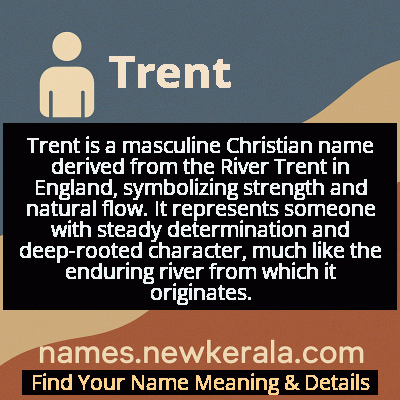Trent Name Meaning & Details
Origin, Popularity, Numerology Analysis & Name Meaning of Trent
Discover the origin, meaning, and cultural significance of the name TRENT. Delve into its historical roots and explore the lasting impact it has had on communities and traditions.
Name
Trent
Gender
Male
Origin
Christian
Lucky Number
5
Meaning of the Name - Trent
Trent is a masculine Christian name derived from the River Trent in England, symbolizing strength and natural flow. It represents someone with steady determination and deep-rooted character, much like the enduring river from which it originates.
Trent - Complete Numerology Analysis
Your Numerology Number
Based on Pythagorean Numerology System
Ruling Planet
Mercury
Positive Nature
Adventurous, dynamic, curious, and social.
Negative Traits
Restless, impatient, inconsistent, prone to indulgence.
Lucky Colours
Green, white.
Lucky Days
Wednesday.
Lucky Stones
Emerald.
Harmony Numbers
1, 3, 9.
Best Suited Professions
Sales, marketing, travel, entertainment.
What People Like About You
Versatility, charisma, adventurous spirit.
Famous People Named Trent
Trent Reznor
Musician
Founder of Nine Inch Nails, multiple Grammy and Academy Award winner
Trent Alexander-Arnold
Professional Footballer
Liverpool FC star, Premier League and Champions League winner
Trent Dilfer
Former NFL Quarterback
Super Bowl XXXV champion with Baltimore Ravens
Trent Williams
Professional Footballer
San Francisco 49ers offensive tackle, multiple Pro Bowl selections
Name Variations & International Equivalents
Click on blue names to explore their detailed meanings. Gray names with will be available soon.
Cultural & Historical Significance
During the medieval period, Trent became established as both a surname and given name, often used by families living near the river or involved in river trade. The name's adoption in Christian communities reflects the common practice of using geographical features as personal names, symbolizing connection to land and heritage while maintaining Christian identity through baptism and religious upbringing. In modern times, the name continues to carry these historical associations while adapting to contemporary naming trends, making it a bridge between traditional English culture and modern global usage.
Extended Personality Analysis
Individuals named Trent are often perceived as strong, reliable, and determined, reflecting the powerful, flowing nature of the river from which the name originates. They tend to possess natural leadership qualities and a steady, persistent approach to challenges, much like a river carving its path through landscape over time. Trents are typically seen as practical problem-solvers who approach life with a grounded perspective and unwavering determination when pursuing their goals. Their personality often combines traditional values with modern adaptability, making them both stable and progressive in their thinking.
Many Trents exhibit a calm exterior that masks deep currents of passion and intensity, emerging when situations demand strong action or defense of their principles. They value loyalty in relationships and often become the anchor points in their social and professional circles, providing steady support and guidance to others while maintaining their own independent course through life's challenges. This combination of surface calmness with underlying strength makes Trents particularly effective in leadership roles where both stability and decisive action are required. Their river-inspired nature means they can adapt to changing circumstances while maintaining their core direction and purpose.
Modern Usage & Popularity
In contemporary times, Trent maintains steady popularity as a strong, masculine name that bridges traditional and modern naming trends. It peaked in popularity during the 1990s in English-speaking countries, particularly in the United States where it reached the top 200 names, and has since settled into consistent moderate usage. The name appeals to parents seeking a name that is familiar but not overly common, with solid Anglo-Saxon roots yet contemporary feel. Trent continues to be popular in Christian communities as a baptismal name that carries geographical and natural symbolism rather than direct biblical association. Its usage spans various English-speaking regions including the United States, United Kingdom, Canada, and Australia, with particular strength in areas with British heritage. The name's versatility allows it to work well across different social and economic backgrounds, from professional settings to creative industries, while its strong, single-syllable sound gives it modern appeal without being trendy.
Symbolic & Spiritual Meanings
Symbolically, Trent represents the powerful, life-giving force of flowing water—embodying concepts of persistence, adaptability, and natural strength. Like a river, the name suggests someone who can overcome obstacles through steady, determined effort while maintaining flexibility in approach. It carries connotations of journey and progression, symbolizing both physical and spiritual movement toward goals. The river symbolism also implies cleansing and renewal, representing the ability to refresh perspectives and navigate emotional depths. In metaphorical terms, Trent signifies boundary-setting and direction, much like rivers that define landscapes and guide travelers. The name evokes images of deep currents beneath calm surfaces, suggesting hidden emotional depths and reserved power that emerges when needed. This combination of visible strength and underlying complexity makes Trent symbolically rich, representing balanced masculinity that combines traditional solidity with modern fluidity while maintaining connection to natural forces and heritage.

